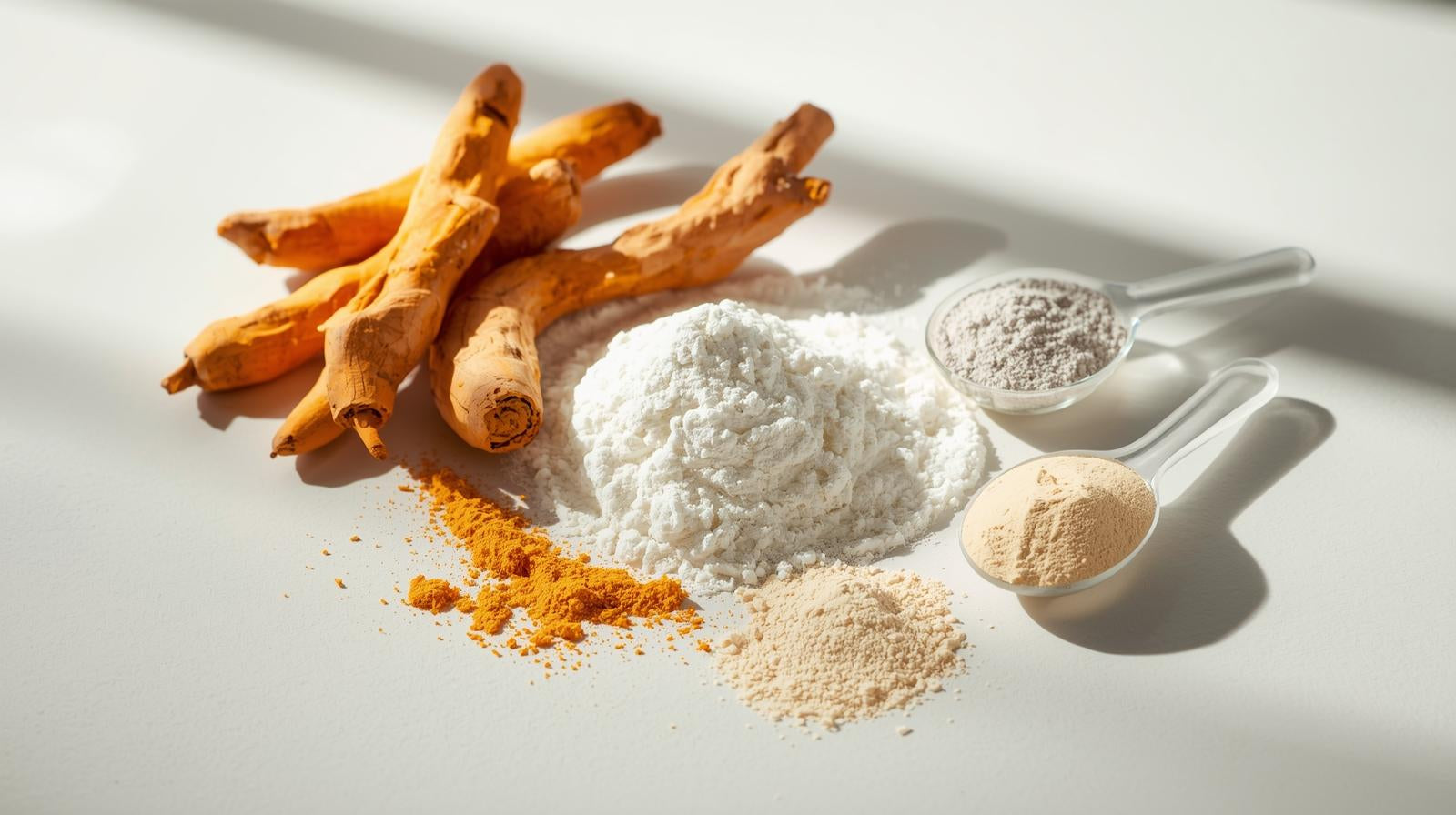If you've noticed your joints feeling stiffer in the morning, your workout recovery taking longer, or wondered why your energy dips more often than it used to, you're not alone. As women enter their mid-30s and beyond, our bodies begin subtle but important changes that affect how we feel and move every day.
The good news? With the right approach to nutrition and supplementation, you can support your body through these changes and maintain the strength and vitality you want for years to come.
Women make up approximately 50.9% of the U.S. population (1), with 39.1% of them being 35 years or older. While a healthy diet and regular exercise form the foundation of wellness, these four powerful supplements can help bridge the gap and support you in feeling strong and healthy as you age.
1. Curcumin - Your Natural Anti-Inflammatory Hero
What It Is: Curcumin, the vibrant compound that gives turmeric its golden color, has been used for thousands of years for its medicinal properties (2). Today, science backs up what traditional medicine has long known about its powerful benefits.
How Curcumin Works for You:
Fights Daily Inflammation That persistent joint stiffness after your morning workout or the lingering soreness that seems to hang around longer than it used to? Chronic inflammation is often the culprit (3). Curcumin helps reduce inflammation and cellular damage by blocking pro-inflammatory pathways, supporting faster recovery and reducing joint discomfort.
Supports Heart Health As we age, cardiovascular health becomes increasingly important. Curcumin improves blood vessel function while providing antioxidant protection, helping lower the risk of heart disease - something particularly relevant as estrogen levels begin to fluctuate (4).
Boosts Brain Function and Mood Juggling work, family, and everything in between? Studies show curcumin can benefit mood regulation by increasing serotonin and dopamine levels, while also offering brain-protective benefits and improved working memory. Because let's be honest - who doesn't want that extra mental clarity? (5)
Getting the Most from Curcumin:
While adding turmeric to your cooking helps, it can be hard to use turmeric daily and use enough of it for these benefits. An easy way to get enough daily is having a Drink ZYN beverage. Each Drink ZYN beverage contains the equivalent of 15 turmeric roots AND they have black pepper extract (piperine) which enhances bioavailability!
2. Collagen - A Building Block for Healthy Joints and Skin
Collagen makes up 30% of your body's total protein and is essential for the structure of your skin, muscles, bones, tendons, ligaments and cartilage. But here's what many women don't realize - after age 25, we lose about 1% of our collagen each year. By your 40s, this can add up to noticeable changes in joint flexibility, skin elasticity, and muscle recovery.
How can we combat this? Lifestyle, nutrition and supplementation.
Lifestyle Habits Optimize these collagen-supporting habits: avoid smoking, limit UV exposure, prioritize sleep, exercise regularly, and stay well-hydrated (E).
Nutrition That Builds Collagen Include foods rich in collagen's building blocks:
-
Vitamin C: citrus fruits, berries, leafy greens, bell peppers, and tomatoes
-
Zinc: shellfish, legumes, meats, nuts, seeds, and whole grains
-
Key amino acids: fish, poultry, meat, eggs, dairy, legumes, and soy
The Supplement Advantage:
Research shows that high-quality collagen peptide supplements can significantly support joint function, skin tone, and exercise recovery. Aim for 15-20 grams of collagen combined with 45-50 mg of vitamin C daily. Available in powder, liquid, or gel forms - choose what fits your routine best.
Pro tip: If you exercise regularly, take your collagen 30-60 minutes before your workout for optimal muscle and joint support. (6)
3. Creatine - More Than Muscle
Creatine is one of the most well-studied supplements available and is well-known for its ability to boost muscle mass, strength, and provide energy for high-intensity exercise. Recently, attention has turned to the benefits of creatine for women, both in and out of the gym, offering unique benefits that become increasingly valuable as we age.
How Women Can Benefit From Creatine:
Sharper Mental Performance Research shows creatine supplementation positively affects mood by restoring brain energy levels and improving cognitive performance - especially during sleep deprivation or stressful mental tasks. (7)
Stronger Bones Through Stronger Muscles When combined with regular strength training, creatine improves bone health by helping build stronger muscles that exert more force on bones during exercise, stimulating healthy bone regeneration.
Faster Recovery Creatine helps you bounce back faster from workouts by accelerating muscle recovery and reducing exercise-induced muscle damage.
Getting Creatine Right:
Creatine is naturally produced in the body and can be obtained through dietary sources like dairy, meat, and fish. Women however tend to consume less creatine than men (8), and our creatine stores decrease with age. Daily supplementation of 5 grams (or 0.03 grams per pound of body weight) can make a meaningful difference in how you perform and feel.
4. Calcium - Your Lifelong Bone Insurance Policy
The Timeline: Calcium, along with vitamin D, are 2 key nutrients for building and maintaining strong bones, which support balance, posture, and mobility. You reached peak bone mass around age 20, and now the focus shifts to maintaining what you've built. This becomes especially crucial as you move through your 30s and 40s, setting the stage for healthy aging (9).
Calcium Needs: (10)
-
Ages 19-50: 1000 mg daily
-
Ages 51+: 1200 mg daily
Smart Calcium Sources:
-
Dairy products: milk (~320 mg per cup), yogurt (300-400 mg per cup), cheddar cheese (200mg per oz)
-
Leafy greens: spinach (245 mg per cooked cup), kale (94 mg per cooked cup), broccoli (72 mg per cup)
-
Nuts and seeds: almonds (75 mg per ounce), Brazil nuts (45 mg per oz)
-
Fortified foods: tofu (450 mg per cup), plant-based milks (~300 mg per cup), cereals (100-250 mg per cup)
When to Consider Supplements:
If you can regularly consume 3+ servings of high calcium foods (300-350+ mg), you should feel confident your hitting 1200+ mg per day. This can be hard, especially if you're dairy-free - in which case supplementation can help. Important: Your intestines can only absorb 500-600 mg at once, so it is best to split up your intake of high calcium foods and/or supplements into multiple doses throughout the day.
Remember: Calcium works best with vitamin D, magnesium, and vitamin K2- consider these partnerships when planning your supplement routine.
Maintaining joint health, muscle strength, and overall longevity is a top priority for women who want to stay active and healthy as they age. Incorporating curcumin, collagen, creatine, and calcium into your routine can support your body’s ability to function optimally and recover quickly so you feel your best. Important: As always, consult with a healthcare provider before adding supplements to your routine to ensure they’re safe for you and a good fit for your individual needs.
References:
1. https://www.census.gov/newsroom/press-releases/2023/2020-census-demographic-profile-and-dhc.html
2.https://pmc.ncbi.nlm.nih.gov/articles/PMC3288651/
3. https://pmc.ncbi.nlm.nih.gov/articles/PMC11009219/
4. https://www.sciencedirect.com/science/article/pii/S0753332220314074
5. https://pmc.ncbi.nlm.nih.gov/articles/PMC11009219/
6. https://pubmed.ncbi.nlm.nih.gov/37758259/
7.https://pubmed.ncbi.nlm.nih.gov/16416332/
8. https://pubmed.ncbi.nlm.nih.gov/37758259/
9. https://pubmed.ncbi.nlm.nih.gov/40433296/
10. https://nap.nationalacademies.org/resource/13050/Vitamin-D-and-Calcium-2010-Report-Brief.pdf
Michelle Tegenkamp, MS RD CSSD LD earned a BS in Dietetics and Kinesiology from Michigan State University, where she competed in cross country and track and field, and a MS in Nutrition Science from the University of Wisconsin, where she also completed her dietetic internship. She is a board-certified specialist in sports dietetics and the owner of Active Nutrition LLC. Working with private clients and local Universities, Michelle focuses on fueling, hydration, and recovery strategies that reduce injuries and support high training loads across youth, collegiate, and professional settings. She currently serves as the Team Dietitian for Portland Thorns FC and previously served as the Director of Nutrition and Dietetics for the Portland Trail Blazers. As a busy mom of 3, Michelle understands the need for an individualized and practical approach. She strives to meet clients where they are and so she can help them perform their best, reach their goals and feel their best!






